How to Treat & Prevent Vehicle Rust Damage
Rust is one of the biggest car maintenance bugbears for drivers. It damages bodywork and, if left untreated, can cause a whole heap of problems.
If your car is damaged in particularly hazardous places, it can result in an MOT failure, which can be pretty costly to repair and will keep you off the road.
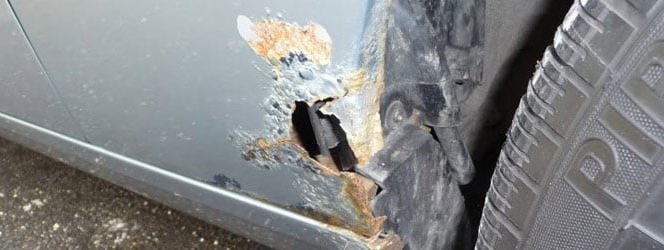
However, there are preventative measures you can take to help protect your vehicle. Knowing how to spot the early signs of rust damage and how to combat it proactively can save you no end of time and money in the long run.
In this guide, leasing experts Nationwide Vehicle Contracts take a look at car rust damage, explaining how to spot it, prevent it, and treat it.
We discuss:
Rust is an iron oxide, usually reddish-brown, and is caused when a metal (i.e. the metal your car's bodywork is made from) reacts with iron, oxygen or water, leading to the breaking down or corrosion of the metal.
Many new vehicles are galvanised, which means they've been coated with a protective layer of zinc to further protect against the damage rust can cause. However, the older your vehicle, the more susceptible it is to rusting.
With age comes scrapes, scratches and dents, giving rust more opportunity to get behind the protective paintwork of your car or van and attack pieces of bare metal.
The most common causes of rust are:

Water
Unfortunately, nowhere in the UK ever stays completely rain-free for long. Leaving your car outside in heavy rain or regularly driving through puddles increases the chances of rust developing.
In particular, water has a habit of gathering in certain areas like the rear tyres, wheel wells and wings. If not dried properly (either by dry, warm weather or parking the vehicle in a garage for a few days), these areas can become particularly prone to rusting.

Poor weather conditions
As we've established, prolonged periods of torrential rain make your car more susceptible to corrosion. Snow has a similar impact if it hasn't been cleared properly. Hot, humid air will also attack any exposed metal on your car.

Geographic location
If you leave your car outside and live on the coast, you can expect rust to pose more of a problem than if you lived further inland.
This is because salty sea water has a knack for finding its way to even the tiniest patches of unprotected pieces of metal. Salt water will cause an object prone to rusting in average conditions to deteriorate considerably quicker.
Furthermore, if your car is left somewhere particularly rural and very open to the elements, you will likely have a bigger problem with rust than those in urban and sheltered areas.

Salt
Salt makes it easier for rust to form, which is why sea water is particularly effective at causing corrosion. The chemical reaction that causes rust involves electrons moving around, and they do so more easily in salt water.
However, even motorists away from the coastline can still suffer salt damage. Grit used to treat roads in freezing weather is a mixture of salt and sand, which can accelerate the formation of vehicle rust if it gets under the paintwork.

Neglect
Many of the factors listed above are unavoidable if you live in some regions of the country and don't have the luxury of owning a garage. However, failing to take steps to prevent damage or act upon the early signs of rusting will only worsen the situation.
Even simply washing your car regularly, particularly in poor weather conditions, can go a long way to prolong the life of your vehicle.
It may seem counter-intuitive (after all, we've established that water helps rust form) but washing your car helps eliminate all the dirt, salt and grime that has built up. The important thing is to make sure it dries nicely and quickly.

The way you drive
Often overlooked is the impact that certain driving habits can have on the likelihood of rust damage. Chips and scratches offer an open invite for rust-causing chemicals to seep in. While you don't need us to tell you to avoid hitting things with your car, there are a couple of other things to consider:
Do you drive too close to other vehicles? Lorries, vans and cars all cause small stones and pebbles to fly up and hit your vehicle, causing those problematic little scratches.
Do you pay particular attention to your driving speed on newly re-surfaced roads? Driving on re-chipped or gravelly roads flicks up even more debris than on tarmacked roads.
Acting early is the most effective way to prevent rust damage from writing off your car. Knowing how to spot the early signs and how to tackle them will prolong the life of your vehicle.
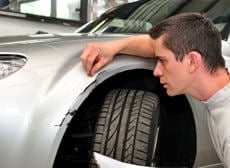
Regularly check your vehicle for scratches and dents
If rust is going to take hold anywhere on your car's bodywork, it's going to be where the paint has been scratched away, leaving exposed metal. So, check your car for dents and scratches regularly – perhaps tie it in with your regular oil and tyre checks. While there may not be any rust visible yet, catching the early warning signs will save you time, money and effort in the long run.
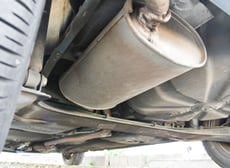
Don’t forget to check underneath your car
Spotting scratches on the paintwork on your car is relatively easy, particularly for those who are reasonably precious about your motor's looks. However, knowing what's going on underneath takes a bit more work. So have a look around under your car on a fairly regular basis, particularly in the winter months, to make sure there are no causes for concern. While it's likely to be a bit on the dirty side, keep an eye out for any patches covered in red dust, bubbling, and small holes.
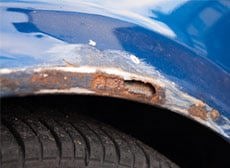
Look out for small bubbles beneath the paintwork
Small patches of bubbling paintwork often alert vehicle owners to a problem. As soon as you spot even a small bubble, act quickly to prevent the rust from spreading.
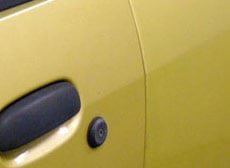
Be vigilant when considering second hand cars
Spotting rust on your vehicle is often not that difficult, provided you know what to look for. However, if you're looking to buy or lease a second-hand car or van, you never know what's been done to address an underlying problem.
Speak to your sales representative and don't be afraid to ask a lot of questions.
“Rust can be classified into three types: surface rust, scale rust, and penetrating rust. Penetrating rust is the most damaging, and may require you to replace parts or panels on your vehicle.”

The most effective way to deal with rust is to prevent it from developing in the first place. Unfortunately, it's a common problem, so you may be unable to eradicate it, but there are measures you can take to help your cause.
Rust prevention methods

Keep your car in a garage
Keeping your vehicle in a garage will protect it from damage caused by adverse weather conditions. Cars parked in damp or exposed environments are more prone to rust.
If garage storage isn't an option, use a high-quality, breathable car cover to protect your car. However, avoid tightly sealed ones that can trap moisture and promote rust.

Wash your car regularly
Keep the body and underside of your vehicle clean of dirt, grime, grit and salts by washing it regularly, particularly during bad weather. If left on the car, they can trap moisture against its metal surfaces, accelerating rust.
You should also pay particular attention to any pockets where water can build up, such as around the wheels.

Tackle any small rust spots early
As soon as you notice any rust developing, no matter how small, remove it, apply an anti-rust primer and repaint it. Rust can spread quicker than you think, so addressing issues promptly can save you time and money in the long run (we discuss this in detail down below).

Apply rustproofing products
Rustproofing sprays and undercarriage sealants create a protective layer that helps prevent moisture and salt from reaching the bare metal. Products like rubberised undercoating or oil-based rust inhibitors work really well.
We'd recommend applying these treatments annually, preferably before winter.

Avoid driving through puddles or flooded areas
Standing water can splash into unprotected areas and accelerate rusting. Try to steer clear of large puddles whenever possible, and if you can't avoid them, remember to inspect and clean the car afterwards.

Keep the interior dry
You might not think this, but moisture trapped inside the car can lead to rust developing from the inside out, particularly around the floor.
Use rubber floor mats if you can and ensure spills or leaks are cleaned up as soon as possible. You can even go one step further and use a small dehumidifier for added rust protection.
Knowing what causes rust and how to spot it is one thing, but what can you do to treat it? Don't worry, rust on a car can be fixed to ensure you're back on the road as soon as possible.
NOTE: If you've got a lease contract with Nationwide Vehicle Contracts, check with your finance provider before completing any rust maintenance on your vehicle.
Superficial rust, often known as surface rust, is the earliest stage of corrosion. While it primarily affects the appearance of your vehicle, addressing it quickly can prevent it from spreading and causing more serious damage.
- Clean the affected area - Wash the rusted area and then dry it thoroughly, ensuring no damaging elements are still on the car. Once cleaned, apply masking tape around the area to protect the surrounding paintwork.
- Sand away the rust - Use a fine-grit sandpaper to remove the rust, sanding until you reach bare metal. Be careful when sanding to avoid damaging the surrounding area.
- Prime the surface - Once you're happy all the rust has been removed, cover the sanded area with an anti-rust primer to prevent the problem from developing again.
- Repaint - After the primer has dried, use a matching touch-up paint to blend seamlessly with your car's colour.
Surface rust goes a step beyond superficial rust, penetrating slightly into the metal but net yet causing flaking or structural damage.
- Get rid of the rust - You'll need something stronger than sandpaper for surface rust. Try and abrasive wheel for moderate damage or even a wire brush, then use sandpaper to smooth the area,
- Apply a primer - Cover the sanded area with an anti-rust primer to prevent the issue from developing again.
- Repaint - After the primer has dried, use the touch-up paint to cover the repaired area.
Permeating rust is the most severe form of corrosion, where the rust eats through the metal and causes structural damage.
Addressing it requires more effort, and we'd recommend seeking professional assistance. As you'd expect, this can be pretty pricey.
The cost of repairing rust damage can vary significantly depending on the severity and location of the corrosion. Here's a general breakdown to help you understand the expenses:
- Minor surface rust - Small areas of rust can often be treated by the driver of the vehicle. It costs around £50-£150.
- Moderate surface rust - This may require professional treatment depending on how bad it is, and will set you back around £150-£500.
- Permeating rust - This is the worst case scenario for rust damage on your car and will most likely require professional expertise. Expect it to set you back anywhere from £500 to £2,000.
Rust can be a costly and damaging issue to have with your car, but with regular maintenance, early detection, and proactive prevention, you can protect your vehicle from rust.
From routine washing to parking indoors and treating chips and scratches ASAP, you can help keep your car in top condition and help it maintain its value.
For more tips, check out our comprehensive car maintenance guides, including Winter Car and Van Care and How to Drive in Extreme Weather.
If you want to avoid the stress of car maintenance, why not consider one of our vehicle maintenance contracts. For a fixed monthly price, all scheduled servicing, replacement tyres, and MOT are covered for the duration of your contract.
For more information, check out our Vehicle Maintenance deals or call us on 0345 811 9595.
Guide Information
Originally published: 23rd September 2015
Last updated: 20th January 2025
